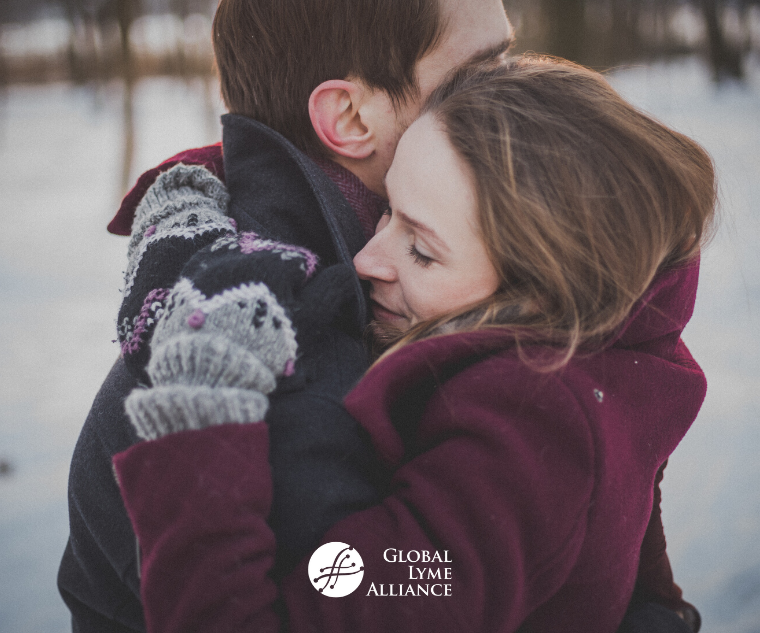
by Jennifer Crystal
Research shows that hugging is good for our health
I remember vividly a scene from the medical show “Grey’s Anatomy” that aired years ago. All that happened in the scene was that a doctor grew overwhelmed and cried, eventually having a panic attack. Slowly, two other doctors embraced her from either side and held her tight. When a fourth doctor came in and asked what was going on, one said, “We’re hugging it out.”
That scene struck me because I saw how the simple act of human touch quelled a serious physiological reaction to emotional stress. Within minutes, the upset doctor’s sobs subsided and her breathing slowed. The original problem that had set off her distress wasn’t gone but her fight-or-flight reaction was.
I have thought of that scene many times during my decades-long journey with chronic illness. So much of that time was spent alone. Patients battling tick-borne or other long-term illnesses are often bedridden with little to occupy their minds besides worry and pain. They may see family members or roommates in the evenings or on weekends, but the endless days of lying in bed can get downright lonely. There were so many times when I thought, I just want a hug.
And there were many times when I got one. When I was convalescing at her home, my mom gave me a hug every day when she came home from work. Friends hugged me when they came to visit. They sent me funny emails and left me voicemails that made me laugh. I sometimes felt hugged even when I didn’t have physical connection with someone.
But I also often felt desperately alone. Lyme disease can be especially isolating because on top of the loneliness that comes from being bedridden, patients often feel misunderstood or invalidated by the people closest to them and by medical professionals. One night I woke from a terrible nightmare with my arms wrapped around myself in a self-hug.
As the “Grey’s Anatomy” scene displayed, physical touch is important for everyone, not just for the infirm. Research shows that hugging is good for our health. In an NBC news report, Michael Murphy, Ph.D., a research associate at the Laboratory for the Study of Stress, Immunity, and Disease in the Department of Psychology at Carnegie Mellon University said, “…touch deactivates the part of the brain that responds to threats, and in turn, fewer hormones are released to signal a stress response, and your cardiovascular system experiences less stress.” Human touch can also stimulate the feel-good hormone oxytocin.[i]
Moreover, touch can help our physical wellness, too. A study by Dr. Murphy’s colleagues, also mentioned in the NBC news report, found that “those who felt socially supported and were hugged more often also experienced less-severe signs of illness.” Physical touch can also boost immunity.
Family therapist Virginia Satir is known for her quote, “We need 4 hugs a day for survival. We need 8 hugs a day for maintenance. We need 12 hugs a day for growth.” That’s a tall order for a bedridden patient, but there are still ways to get the connection we need. We can ask for or initiate hugs with people with whom we are close. Caregivers and friends can think about giving more hugs to their loved ones who are ill (the benefits go both ways!). The touch aspects of therapies like integrative manual therapy or light massage can also be soothing. And for those who aren’t comfortable with physical touch or who live alone, simply connecting with others—whether it’s through social media, email, an online or in-person support group—can simulate the benefits of hugging and make you feel less alone.
Hugging won’t cure illness, or emotional stress, or the woes of the world, but it can lay the groundwork for subsequent healing. In our technological age, it would behoove us to follow the advice of the old song: “Reach out and touch someone.”
1 https://www.nbcnews.com/better/pop-culture/health-benefits-hugging-ncna920751

Opinions expressed by contributors are their own.
Jennifer Crystal is a writer and educator in Boston. Her memoir about her medical journey is forthcoming. Contact her at lymewarriorjennifercrystal@gmail.com.

Jennifer Crystal
Writer
Opinions expressed by contributors are their own. Jennifer Crystal is a writer and educator in Boston. Her work has appeared in local and national publications including Harvard Health Publishing and The Boston Globe. As a GLA columnist for over a decade, her work on GLA.org has received mention in publications such as The New Yorker, weatherchannel.com, CQ Researcher, and ProHealth.com. Jennifer is a patient advocate who has dealt with chronic illness, including Lyme and other tick-borne infections. Her memoir, One Tick Stopped the Clock, was published by Legacy Book Press in 2024. Ten percent of proceeds from the book will go to Global Lyme Alliance. Contact her via email below.




-2.jpg)

